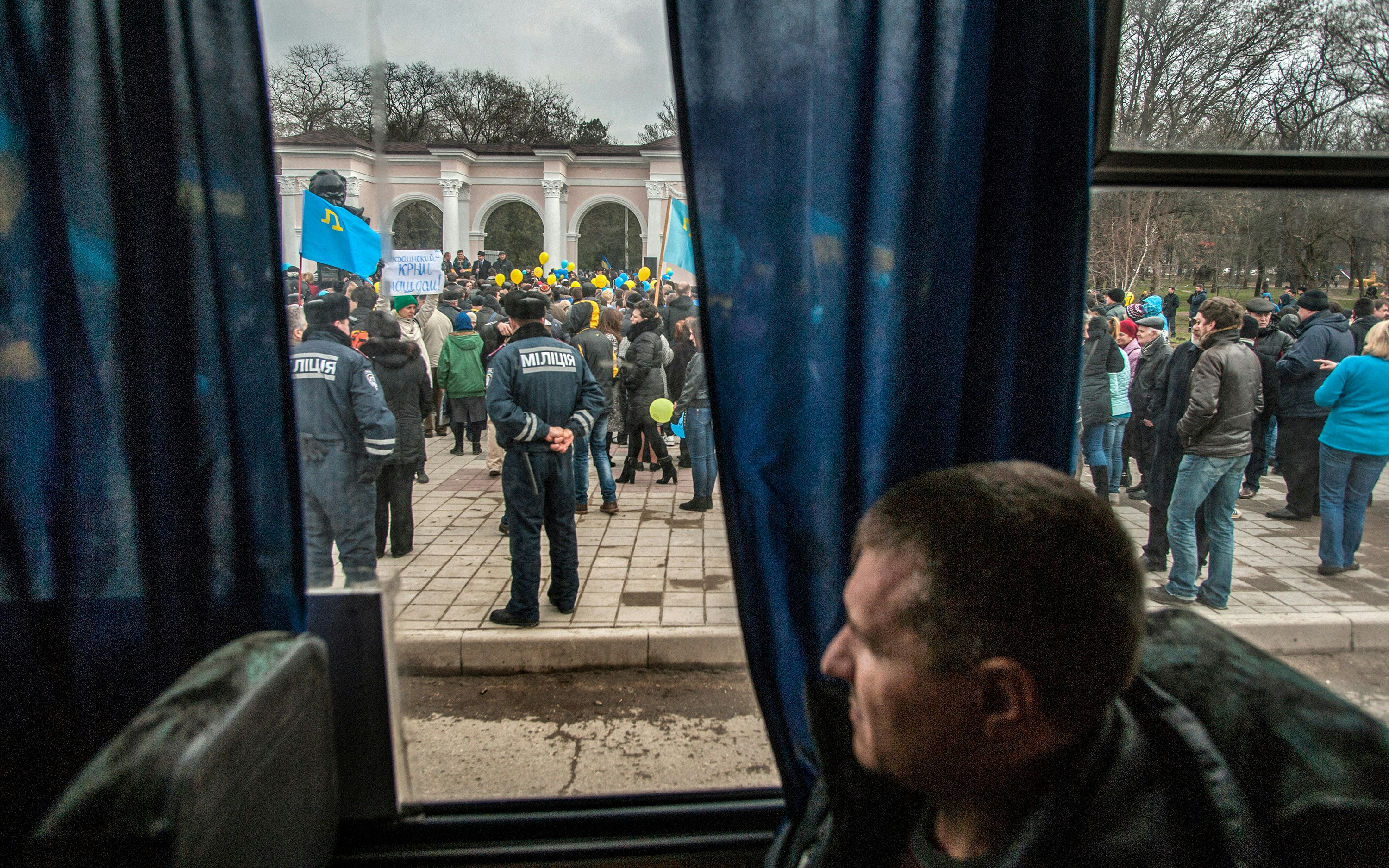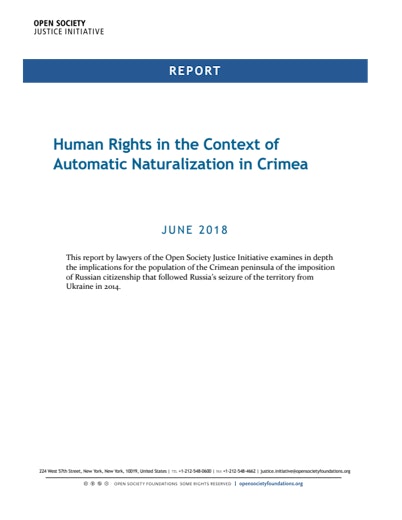Sentsov and Kolchenko v. Russia
Fair Trial Rights Violated Due to Imposition of Nationality
The foundational right to nationality includes the right to acquire, change and retain one’s nationality. States must comply with international law—including human rights and humanitarian law—concerning the granting and loss of nationality. State control over citizenship, including depriving one of meaningful choice in their nationality, can also impede the exercise of other fundamental rights. At times, and contrary to international law, States manipulate citizenship to exclude, suppress, target and control both persons and territory.
Following the unlawful annexation of Crimea (Ukraine), the Russian Federation imposed Russian citizenship on all Crimean residents, in violation of one’s nationality rights. Illegally stripped of Ukrainian citizenship, newly-minted Russian nationals were considered by Russia to fall under the State’s legal jurisdiction in all matters, including movement, allegiance and criminal liability. Under this reasoning, Russia criminally charged Crimeans who opposed occupation as terrorists, often resorting to torture in attempts to extract confessions and information. Russia also transferred the “new” Russians to mainland Russia, where they were tried in Russian courts and imprisoned in Russian facilities, contrary to international human rights and humanitarian law.
Facts
Subsequent to the illegal annexation of Crimea in March 2014, the Russian Federation imposed Russian citizenship on all Crimean residents. Under a “treaty” orchestrated by the de facto authorities and Moscow, these converted “Russian citizens” had 18 days to come forward to proactively “opt out” of Russian citizenship and “retain” Ukrainian citizenship. The opt out process unfolded in an atmosphere of hostility, coercion, confusion, and with a myriad of procedural defects. Many of those who were outside Crimea or were committed to closed institutions, such as jails, psychiatric facilities, and orphanages, lack the opportunity to opt out. Russia integrated all Crimean penitentiary institutions into its own, thereby transferring Ukrainian prisoners and detainees to facilities in mainland Russia. According to Ukrainian human rights experts, over 4,700 Ukrainian citizens kept in places of detention were transferred to penal colonies located in the Russian Federation. Inversely, Russia increased migration of its own civilian population into Crimea, in an attempt to manipulate of the peninsula’s demographic composition. Russia also conscripted thousands of new “Russian citizens” into its military. Since 2014, the de facto authorities, unlawfully imposed Russian laws in the context of occupation, prosecuting those who opposed annexation as terrorists or separatists.
Oleg Sentsov and Aleksandr Kolchenko are Ukrainian nationals who Russia claims became Russian citizens following annexation. Mr. Sentsov is a native of Crimea and a well-known writer and filmmaker who opposed annexation by delivering food supplies to the Ukrainian army units trapped in their barracks. On May 10, 2014, Mr. Sentsov was arrested by officers of Russia’s Federal Security Service on “terrorism” charges and taken to a local police station where he was beaten, asphyxiated, electrocuted and threatened with rape. A doctor later documented numerous bruises and hematomas on his body. Mr. Kolchenko is a Ukrainian activist and supporter of a united Ukraine, including Crimea. On May 16, 2014, he was arrested on suspicion of membership in a “terrorist” group allegedly headed by Mr. Sentsov. Days later, Mr. Sentsov and Mr. Kolchenko were transferred into detention centers in Moscow.
On August 25, 2015 the Military Court of the North-Caucasian Command convicted Mr. Sentsov and Mr. Kolchenko and sentenced them to twenty- and ten-years’ imprisonment, respectively. These convictions were upheld on appeal and they began serving prison sentences in correctional colonies in Russia. Both men were subsequently released from prison on September 7, 2019, as part of a prisoner swap between Ukraine and Russia.
The Russian Federation used it imposition of citizenship as a basis for rendering and exercising criminal jurisdiction over Mr. Sentsov and Mr. Kolchenko, upon whom, as residents of Crimea, Russian nationality was imposed. Among other allegations, Mr. Sentsov and Mr. Kolchenko allege they were not brought before “a tribunal established by law,” in part because Russia’s acknowledgement of them as Russian citizens is illegal under international law and has no legal effect, and that their trial was unfair because their conviction rested on evidence obtained through torture, both in violation of Article 6(1) of the European Convention on Human Rights (ECHR). Mr. Sentsov and Mr. Kolchenko maintain that that they are in fact Ukrainian, and they do not recognize Russian citizenship.
The two men were released from Russian custody on September 7, 2019, as part of a prisoner swap with Ukraine.
Open Society Justice Initiative Involvement
The Open Society Justice Initiative filed a third-party intervention to the European Court considering the legal effects of imposition of Russian citizenship by Russian occupying authorities in Crimea (Ukraine) in respect of the applicants’ fair trial rights under Article 6(1) of the ECHR, read alongside international humanitarian law (IHL), in particular the law of occupation.
Arguments
The Justice Initiative addressed the following issues:
The relevance of international humanitarian law. The Russian Federation’s status as an Occupying Power at the time of the relevant events is inseparable from human rights law, as embodied in international and European law, including the right to nationality and the right to a fair trial, which must be respected by an Occupying Power.
The imposition of Russian citizenship in occupied Crimea. Unlawful imposition of citizenship cannot constitute a valid legal justification for exercising jurisdiction over occupied populations.
The transfer of the applicants to the territory of the Russian Federation and their subsequent trial and conviction by domestic courts as Russian nationals. The unlawful imposition of Russian citizenship, in order to physically transfer prisoners, including Mr. Sentsov and Mr. Kolchenko, from Ukraine to Russian territory as “Russians” facilitated and is therefore implicated in the exercise of jurisdiction by Russian courts in their trials. Article 49 of the GCIV prohibits an Occupying Power from transferring civilians to its own territory “regardless of motive.” Article 147 constitutes such “unlawful transfer” as a grave breach of IHL.
A tribunal that does not have jurisdiction to try a defendant is not “established by law.” Article 6(1) of the ECHR (Right to a fair trial) requires that those charged with criminal offenses be tried by a “tribunal established by law.” According to the Court, a tribunal established by law “envisages the whole organisational set-up of the courts, including...the matters coming within the jurisdiction of a certain category of courts...” The Russian court that tried the applicants was established through recourse to an illegal law or procedure and thus oversteps the limits of its jurisdiction and is not established by law, thereby violating the right to fair trial.
Sentsov and Kolchenko are released from Russian custody in a prisoner exchange with Ukraine.
The Open Society Justice Initiative submits a third-party intervention to the ECHR in the case.
The ECHR communicates Senstov and Kolchenko’s case to the Russian Federation.
Sentsov and Kolchenko lodge an application with the European Court of Human Rights.
The Supreme Court of the Russian Federation uphold Sentsov and Kolchenko’s convictions.
The Military Court of the North-Caucasian Command convicts Sentsov and Kolchenko of terrorism and sentenced them to twenty- and ten-years’ imprisonment, respectively, and imprisoned in Russia.
Oleg Sentsov is arrested on suspicion of membership in a “terrorist” group, followed by Aleksandr Kolchenko on May 16. Both are subsequently transferred into detention in Moscow and Ukrainian authorities are banned from interaction with either man.
Final day to opt out of Russian citizenship. Due to multiple hindrances in accessing the opt out procedure, Russian authorities automatically grant nationality to approximately 96 percent of Crimeans, declaring them subjects of the Russian Federation.
The Russian Federation enacts Federal Constitutional Law No. 6-FKZ, which codified automatic recognition of all who were deemed to be residing permanently in Crimea as Russian citizens, unless they opt out by April 18, 2014. Dual citizenship is not an option.
The Russian Federation and the so-called “Republic of Crimea” sign a Treaty on the Accession of the Republic of Crimea to the Russian Federation in Moscow, annexing the peninsula into the Russian Federation. Russian law is now implemented in Crimea.
Russia launches occupation of Ukraine's Crimea peninsula.
Related Work
Case Watch: Ukraine ICJ Ruling Strengthens Protections against Discriminatory Use of Citizenship Law
In agreeing to proceed with a complaint by Ukraine against the Russian Federation, the International Court of Justice underlined the principle that states cannot use exclusionary citizenship laws to discriminate, and that such action can be challenged before its judges.

Human Rights in the Context of Automatic Naturalization in Crimea
This report examines the implications for the population of the Crimean peninsula of the imposition of Russian citizenship that followed Russia’s seizure of the territory from Ukraine in 2014.

New Kenya High Court Judgment Sets Important Precedent for Digital ID Privacy Protections and Processes
The Justice Initiative welcomes a Kenyan High Court judgment declaring the data collection and roll-out of biometric Huduma cards for the country’s digital ID system, the National Integrated Identity Management System (NIIMS), unconstitutional.